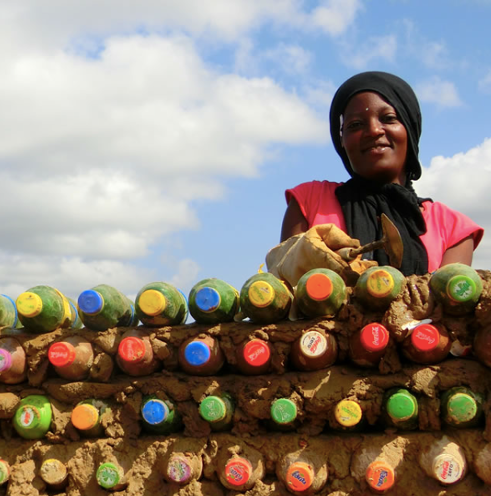
HARD TRUTHS, LASTING INSIGHTS
Like the concentric rings of a tree, the very first ventures on our journey revealed the core principles that would shape everything that followed. From agri-schools that generated their own income, to community biodiesel initiatives, social innovation awards, and global knowledge-exchange conferences, these experiences surfaced enduring truths: sustainability must be self-propelling, education is most powerful when it equips participants to create economic value, and integrated systems of learning, enterprise, and community engagement multiply impact.
The hard lessons - trust-building, infrastructure gaps, and the danger of scaling hastily - came hand-in-hand with insight: sustainable development cannot be imposed from outside, and Western-style operational models, when unadapted, often ignore local norms, governance, and community dynamics.
Impact is not about transplanting ready-made solutions, but about understanding the unique energy, capacity, and priorities of local stakeholders, and then co-creating initiatives that respect and amplify those assets.
Project Eden
When Vision Meets Terrain:
Learning from Karatara

Intention
The intention behind Project Eden was bold and visionary: to replicate the CIDA City Campus model of low-cost, consciousness-based tertiary education in a deeply rural and structurally neglected area—Karatara, Western Cape. It sought not just to educate, but to regenerate: using eco-agriculture, eco-tourism, and eco-construction as pillars for community upliftment. The idea was to empower youth to become self-sustaining, socially conscious entrepreneurs rooted in the local ecology and economy.
Karatara became a canvas for dreaming big in hard places. The plan combined educational reform, ecological sensitivity, agriculture and social enterprise—redefining development in a way that moved beyond aid to dignity. It was also an experiment in how a public-good model could thrive away from the urban gravitational pull, where neglect and invisibility often prevail.
What we learned
-
Building in a vacuum of public infrastructure and long-term state support is precarious. Goodwill is not enough when systems around the project are either absent or resistant to transformation.
-
Rural regeneration demands more than replicating urban models in new settings. It requires deep adaptation to context—social, political, and geographic.
-
The emotional and symbolic power of reclaiming segregated, impoverished landscapes through learning is immense. But symbolic power must be matched with structural coherence.
-
Community ownership needs time, trust, and facilitation. Quick wins aren’t enough to shift decades of structural exclusion.
-
Dreams must be allowed to evolve. Even where projects do not materialise as hoped, the learning—about vision, dignity, partnership, and limits—is catalytic.
-
The ethos seeded in Karatara—of low-cost, high-impact education rooted in ecological and social consciousness—laid groundwork for future TSF approaches to regenerative models, dignity-first partnerships, and field-based learning ecosystems.
Mozambique
Agro-Enterprise & Biodiesel Project

Intention
The intention of the Headway Mozambique Project was to establish a sustainable, commercially viable, and vertically integrated coconut-based enterprise in Inhambane, Mozambique, with the objective of generating long-term economic value for rural communities while contributing to renewable energy development. The project integrated economic, social, and environmental objectives through the following initiatives:
-
Rejuvenate existing coconut plantations and develop new plantations with world-class production and operational systems.
-
Establish inclusive rural business hubs to support local entrepreneurship and trade.
-
Provide education, skills training, and mentorship programs to build local capacity.
-
Improve healthcare infrastructure, including clinics and mobile medical services.
-
Develop a biodiesel value chain starting with local copra production and processing.
-
Create jobs and fostered entrepreneurship in coconut farming and oil production.
-
Partner with government entities and local farmers to promote plantation revitalisation, intercropping, and land rehabilitation.
-
Build integrated agro-processing infrastructure for virgin oil, desiccated coconut, and coco-peat products.
-
Support local and national economic stability, aligned with government policies and global sustainable development goals.
What we learned
-
Training, Community Engagement, and Management Innovation Were Critical: Deeper, slower and more intensive workforce training, community involvement, and innovative plantation management practices were essential for any chance of success.
-
Integrated Commercial, Social, and Humanitarian Model Works: Despite the scope and ambition, the project demonstrated that an even more holistic approach could create enduring benefits for local communities, the broader Mozambican economy, and the global coconut industry.
-
Local Trust Matters: Building relationships with local traders and paying in cash earned loyalty and reliability. Transactional fairness often overrode formal agreements in environments where trust functioned as currency.
-
Market Demand and Financial Viability required prime quality products: Despite good market engagement global demand for quality coconut based products, combined with demanding production efficiencies, led to challenges in meeting the project’s potential for profitability and sustainability.
-
Infrastructure Gaps Limited Growth: Limitations in logistics, processing capacity (especially drying and filtration), and transport infrastructure in tough rural and forest environments were critical barriers. Insufficient infrastructure for collection points and extreme transport challenges prevented the enterprise from meeting production goals.
-
Diversification Was Visionary but Demanding: The potential to produce virgin oil, coconut water, desiccated coconut, coir products, and more was real. However, without secure, phased investment and clear market demand, the full vision could not be realised within the expected time frame.
-
Biodiesel Hype vs. Local Reality: While globally compelling, biodiesel projects needed to be rooted in local energy needs rather than distant carbon credit schemes or donor-driven agendas. The idea of creating an “Aid-Free Zone” was bold but operationally ahead of its time.
-
Agricultural Revitalisation Requires Patience: Developing land for long-term agro-forestry demanded alignment with government and community priorities. The vision for 1,000 to 50,000-hectare plantations was sound but required generational timelines, which were not generally investor-friendly.
-
Existing Operations and Proven Technology Reduced Risk: The project built on established operations and technologies in Inhambane, with experienced local management and strong government relationships that attempted to reduce operational and political risks.
Agri-colleges ETP4i
Education that pays for itself

Intention
The intention was to explore models of education where schools don’t just teach sustainability—they live it. TSF aimed to support agri-colleges and vocational institutions that generate income through the sale of goods—organic produce, dairy, baked products, and other marketable outputs. This approach reduces dependence on external funding while embedding entrepreneurial thinking into the curriculum.
The broader vision was to empower young people to become job creators rather than job seekers. When a student plants a seed, tends it, sells it, and feeds their family with it—they are not merely learning. They are actively rewriting the rules of education, linking knowledge with action, and turning school into a microcosm of the economy itself.
What we learned
-
Student-Led Enterprise Changes Everything: Schools that generated income through student enterprises saw a transformation in ownership, engagement, and dignity—particularly in communities historically excluded from economic participation. Students experienced the tangible results of their work, reinforcing learning and self-worth.
-
Hands-On Skills Meet Business Acumen: Integrating agricultural training with practical business education fostered a pedagogy of self-reliance. Students learned not only how to farm, but also how to market, account for, and sell their products—bridging vocational skills with real-world economic literacy.
-
Global Networks Amplify Impact: TSF convened conferences connecting agri-college leaders from across continents. These forums seeded a movement of shared practice, innovation, and mutual upliftment. They showcased how local solutions could scale through global exchange, demonstrating new possibilities and revealing models that could be adapted elsewhere.
-
Government Engagement Remains a Barrier: Despite the success of these models, widespread adoption depends on policy recognition. Governments often fail to realise the value of education-based enterprises that both teach children to generate income and support institutional sustainability. Had these models been implemented broadly across the Agri-Colleges, South Africa alone could have seen 30+ colleges contributing meaningfully to local economies—the potential for systemic change would have been immense.
-
Education as Regeneration: Perhaps the most profound learning was that schools can act as engines of regeneration—not only for land and ecosystems, but also for self-worth, community resilience, and broader economic participation. By linking education, enterprise, and sustainability, students are equipped to navigate and transform their worlds.
-
Inspiration from Global Practice: Case studies such as the Cerrito School in Paraguay highlight the potential of these models in diverse contexts, showing how agriculture-based education can drive rural development, community cohesion, and economic empowerment.
Conferences and Community of Practice
TSF’s global convenings were more than events—they were catalysts for a shared movement:
-
Forums connected agri-college leaders from Africa, Latin America, and beyond.
-
Best practices in student-led enterprise, market integration, and curriculum innovation were exchanged.
-
Conferences nurtured collaborative problem-solving, mentoring, and innovation networks.
-
They demonstrated that education could simultaneously meet social, environmental, and economic objectives, providing a replicable blueprint for self-sustaining schools.
Pan-African Innovation Awards -
Scouting Ground-breakers

Intention
To shine a light on grassroots innovators across Africa—people already solving local problems in extraordinary ways—and reward them with catalytic funding and recognition.
Competitions are scouting systems. They attract unlikely heroes—the kind who don’t wait for permission to change things. A modest prize purse can create outsized ripples, especially when matched with visibility and validation.
In partnership with Teach a Man to Fish, this award scheme ran for a decade, surfacing change-makers through a continent-wide competition that aligned perfectly with TSF’s ethos.
What we learned
-
Designing a system where local ingenuity is noticed, celebrated, and resourced creates a feedback loop of inspiration: others start innovating just by watching someone win.
-
These awards often served as portals into partnership: TSF discovered The Clothing Bank (TCB) through this competition, a relationship that went on to redefine its approach to enterprise and inclusion.
-
Supporting it for 10 years taught us: talent is everywhere, access isn’t. So, create the conditions where talent gets seen.
Tomorrow's leaders in Training (TLT)

Intention
To meet the increasing needs of young people within public schools in South Africa to deal with the challenges of this era, we supported Tomorrow’s Leaders in Training (TLT) with the belief that youth leadership development—when rooted in community, purpose, and lived experience—can shape a more just and inspired future. The program’s ambition aligned with our values: nurturing self-aware, socially conscious young people with the tools to lead from within.
What we learned
-
Supporting ecosystem-building organisations requires not just passion, but robust governance and clear alignment in financial stewardship.
-
Due diligence is an ongoing process, not a one-time check. Even strong concepts need consistent reflection and accountability to remain values-aligned.
-
Sometimes the right call is to step back with grace, without undermining the broader mission or discrediting future iterations that may still deliver impact.
-
Learning when to exit is as important as knowing when to enter—especially when it protects TSF’s integrity and focus.
-
Not all partnerships flourish, but each offers insight into refining how we engage: with clarity, curiosity, and the courage to course-correct.
